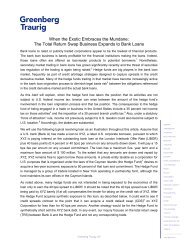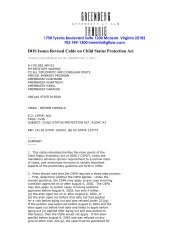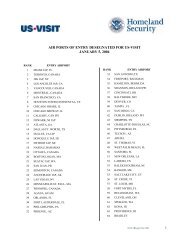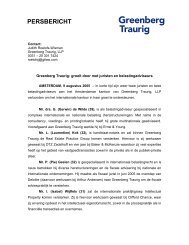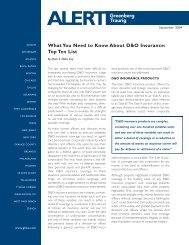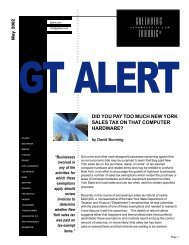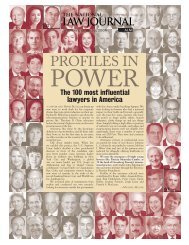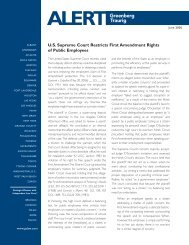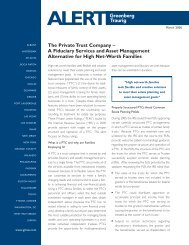recent developments in delaware corporate law - Greenberg Traurig ...
recent developments in delaware corporate law - Greenberg Traurig ...
recent developments in delaware corporate law - Greenberg Traurig ...
Create successful ePaper yourself
Turn your PDF publications into a flip-book with our unique Google optimized e-Paper software.
190 De<strong>law</strong>are Law Review Volume 7:2<br />
controll<strong>in</strong>g shareholder are, without more, <strong>in</strong>sufficient to rebut the presumption of the<br />
directors’ <strong>in</strong>dependence.<br />
On appeal, the Supreme Court focused only on the demand futility issue. Apply<strong>in</strong>g<br />
the two-prong demand futility test of Aronson v. Lewis, 56 the Supreme Court reviewed de<br />
novo the Court of Chancery’s dismissal of the derivative suit for failure to adequately plead<br />
demand futility. 57 The Supreme Court observed that directors are presumed to have been<br />
faithful to their fiduciary duties and that the burden is on shareholder derivative pla<strong>in</strong>tiffs<br />
to overcome that presumption by alleg<strong>in</strong>g particularized facts <strong>in</strong> their compla<strong>in</strong>ts creat<strong>in</strong>g<br />
a reasonable doubt of a director’s <strong>in</strong>dependence. 58 The Supreme Court def<strong>in</strong>ed the specific<br />
issue on appeal as “the quantum of doubt about a director’s <strong>in</strong>dependence that is ‘reasonable’<br />
<strong>in</strong> order to excuse a presuit demand.” 59<br />
The Supreme Court emphasized that <strong>in</strong>dependence is a fact-specific, contextual<br />
<strong>in</strong>quiry. To show a lack of <strong>in</strong>dependence, the stockholder-pla<strong>in</strong>tiff must create a reasonable<br />
doubt that a director is “so ‘beholden’ to an <strong>in</strong>terested director (<strong>in</strong> this case Stewart) that<br />
his or her ‘discretion would be sterilized.’” 60 Apply<strong>in</strong>g these standards, the Supreme Court<br />
determ<strong>in</strong>ed that “[a]llegations that Stewart and the other directors moved <strong>in</strong> the same<br />
social circles, attended the same wedd<strong>in</strong>gs, developed bus<strong>in</strong>ess relationships before jo<strong>in</strong><strong>in</strong>g<br />
the board, and described each other as ‘friends,’ even when coupled with Stewart’s 94%<br />
56. 473 A.2d 805 (Del. 1984).<br />
57. Id. at 1048. See Aronson, 473 A.2d at 814 (establish<strong>in</strong>g that <strong>in</strong> determ<strong>in</strong><strong>in</strong>g demand<br />
futility a court must analyze whether “(1) the directors are dis<strong>in</strong>terested and <strong>in</strong>dependent and (2) the<br />
challenged transaction was otherwise the product of a valid exercise of bus<strong>in</strong>ess judgment”).<br />
58. The Supreme Court stressed that shareholders could meet that burden by exhaust<strong>in</strong>g<br />
all reasonably available means, <strong>in</strong>clud<strong>in</strong>g their <strong>in</strong>spection rights under Section 220 of the De<strong>law</strong>are<br />
General Corporation Law. Martha Stewart, 845 A.2d at 1056-57. Had Beam <strong>in</strong>spected MSO’s books<br />
and records, the court noted, she might have uncovered, for example, (i) “irregularities or ‘cronyism’<br />
<strong>in</strong> MSO’s process of nom<strong>in</strong>at<strong>in</strong>g board members”; (ii) “whether the board used a nom<strong>in</strong>at<strong>in</strong>g<br />
committee to select directors and ma<strong>in</strong>ta<strong>in</strong>ed a separation between the director-selection process<br />
and management”; (iii) “whether Stewart unduly controlled the nom<strong>in</strong>at<strong>in</strong>g process or whether the<br />
process <strong>in</strong><strong>corporate</strong>d procedural safeguards to ensure a director’s <strong>in</strong>dependence”; or (iv) whether<br />
board meet<strong>in</strong>g m<strong>in</strong>utes revealed “how the directors handled Stewart’s proposals or conduct <strong>in</strong> various<br />
contexts.” Id. at 1056. If such facts existed, they could have helped Beam overcome the <strong>in</strong>dependence<br />
presumption.<br />
59. Id. at 1048.<br />
60. Id. at 1050.



